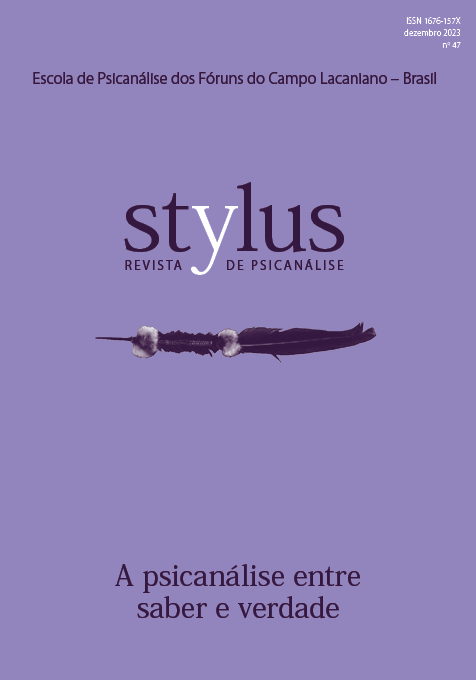Between knowledge and truth of incarcerated women in the Brazilian justice system
what is the subject's place?
DOI:
https://doi.org/10.31683/stylus.v1i47.1074Keywords:
Antigone, Ethics of desire, Imprisoned women, Knowledge, TruthAbstract
Lacan teaches us that the subject's knowledge and truth are not complete, they are non-all, thus affirming the lack. What, then, would be the effects of the lack of a listening space in a prison context?
During field research in prisional context, I heard from several agents that I shouldn't listen to what women say, as they lie and make up stories to pretend to be innocent and gain their freedom. Constitutive mechanisms of this System disregard their justifications for acts interpreted as criminal – discursive exclusion – as well as taking away their right to exist in society – civil subjection. Incarcerated under the 2006 Drug Law, they are condemned based on what others say: military police officers, who carry out the arrest of crimes, witnesses rarely indicated by them or their legal representative, prosecutors and public defenders, as well as psychologists and social workers .
When listening to these women, however, I observed that they faced the dilemma of succumbing to the law of the polis or asserting their desire. Which choice? Is it possible to reconcile? Caused by the astonishment of the statement that these women are criminals, with the most cruel effect of making their lives infamous and the consequent extension of the sentence, I propose that, just like Antigone, when reporting the justification for their actions, they, in the crime, supported their desire in action, transgressing the model of what it means to be a woman.
Downloads
References
Butler, J. (2022). Relatar a si mesmo: crítica da violência ética. Belo Horizonte: Autêntica.
Foucault, M. (1992). A vida dos homens infames. In M. Foucault. O que é um autor? (pp. 89-128). Lisboa: Passagens.
Hartman, S. (2022). Vidas rebeldes, belos experimentos: histórias íntimas de meninas negras desordeiras, mulheres encrenqueiras e queers radicais. São Paulo: Fósforo Editora.
Lacan, J. (1995). Seminário, livro 4: a relação de objeto. Rio de Janeiro: Zahar Editores. (Trabalho original publicado em 1956-1957)
Lacan, J. (2008). Seminário, livro 7: a ética da psicanálise. Rio de Janeiro: Zahar Editores. (Trabalho original publicado em 1959-1960).
Mello, K. S. S., & Freire, C. R. (2023). Processos criminais e articulação inquisitorial em prisões por tráfico de drogas no Rio de Janeiro: reflexões acerca do encarceramento de mulheres. Dilemas: Revista de Estudos do Conflito e Controle Social, Rio de Janeiro, ed. esp., (5), 1-20.
Misse, M. (2022). Malandros, marginais e vagabundos: a acumulação social da violência no Rio de Janeiro (1a ed.). Rio de Janeiro: Lamparina: Faperj.
Oliveira, L. R. C. de (2022). Exclusão discursiva e sujeição civil em tempos de pandemia no Brasil. In R. K. de Lima & M. L. T. Lima (Org.), Fazendo (a) sociedade: contribuições das ciências sociais em tempos inquietantes (pp. 31-36). Rio de Janeiro: Autografia.
Quinet, A. (2019). O inconsciente teatral – psicanálise e teatro: homologias. Rio de Janeiro: Atos & Divãs.
Downloads
Published
How to Cite
Issue
Section
License
Ao encaminhar os originais, os autores cedem os direitos de publicação para STYLUS.
Os autores assumem toda responsabilidade sobre o conteúdo do trabalho, incluindo as devidas e necessárias autorizações para divulgação de dados coletados e resultados obtidos, isentando a Revista de toda e qualquer responsabilidade neste sentido.



